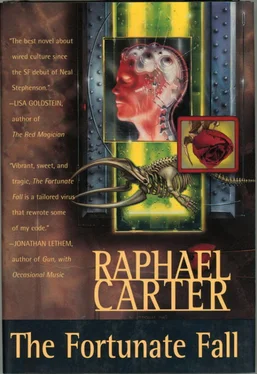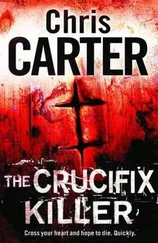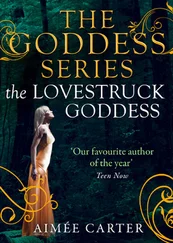Raphael Carter - The Fortunate Fall
Здесь есть возможность читать онлайн «Raphael Carter - The Fortunate Fall» весь текст электронной книги совершенно бесплатно (целиком полную версию без сокращений). В некоторых случаях можно слушать аудио, скачать через торрент в формате fb2 и присутствует краткое содержание. Город: New York, Год выпуска: 1996, ISBN: 1996, Издательство: Tor Books, Жанр: Киберпанк, на английском языке. Описание произведения, (предисловие) а так же отзывы посетителей доступны на портале библиотеки ЛибКат.
- Название:The Fortunate Fall
- Автор:
- Издательство:Tor Books
- Жанр:
- Год:1996
- Город:New York
- ISBN:0-312-86034-X
- Рейтинг книги:3 / 5. Голосов: 1
-
Избранное:Добавить в избранное
- Отзывы:
-
Ваша оценка:
- 60
- 1
- 2
- 3
- 4
- 5
The Fortunate Fall: краткое содержание, описание и аннотация
Предлагаем к чтению аннотацию, описание, краткое содержание или предисловие (зависит от того, что написал сам автор книги «The Fortunate Fall»). Если вы не нашли необходимую информацию о книге — напишите в комментариях, мы постараемся отыскать её.
“Gripping…. One of the most promising SF debuts in recent years”.
—“Publisher’s Weekly” starred review
The Fortunate Fall — читать онлайн бесплатно полную книгу (весь текст) целиком
Ниже представлен текст книги, разбитый по страницам. Система сохранения места последней прочитанной страницы, позволяет с удобством читать онлайн бесплатно книгу «The Fortunate Fall», без необходимости каждый раз заново искать на чём Вы остановились. Поставьте закладку, и сможете в любой момент перейти на страницу, на которой закончили чтение.
Интервал:
Закладка:
“‘Defy’ sounds as if I was hurling insults at them on the street. The reality was more like a whisper in a darkened room that the wrong person overheard. And even that I would never have done, if not for a fellow student named Katya Andersohna.”
I didn’t need a moistdisk to recognize that name. “Any relation to Harold Anderson?”
“She was his daughter.”
“A dangerous person to know, then.”
He nodded, his hands pausing above the plate. “Yes, very much so. But not for the reason you think. She was a four-nine.”
“Harold Anderson’s kid was a dissident? That’s hard to believe.”
“Katya Andersohna was dissidence at MGU. Without her there would have been nothing. She was an amazing person; she had inherited her father’s genius and her mother’s beauty, and to that she added humanity, a trait neither of her parents appeared to possess. Perhaps compassion is an environmental illness rather than a genetic disorder. Or I should say, a bacillus, for she was quite successful at infecting others…. But I’m getting ahead of myself,” he said, shaking his head a little, as though this Katya were a subject whose gravitation he escaped with difficulty. He turned his attention to his plate. I groped for some banal question in order to fill in the dead audio time, then stopped: to watch him eat was fascination enough. Before each cut, he rotated the plate to the correct angle, as if the dance of his knife and fork were programmed andimmutable. The swift, practiced movements of his hands made me think of a sign language, or of a series of magical passes by which the food was made to disappear.
Voskresenye raised an eyebrow, and I realized that I’d been watching him too long. “I’m sorry,” I said. “Staring’s an occupational hazard.”
“Not at all. If my being a freak will get people to listen, I am pleased to be one.”
I let that sink in and then asked: “How did you get mixed up with Katya Andersohna?”
“Not by choice, that’s for certain,” he said, laying down his knife. “I had no idea she was a dissident, nor did I know her by the Russian form of her name. To me she was Catharine Anderson, the chief of propaganda for the Student League, a thing to be feared; and the daughter of the Heptarch, all the more terrifying. I rarely saw her, and when I did, I deemed it prudent to go the other way.”
“Then how did it happen?”
“She approached my table one day in the library. I was bent over Aeschylus, so all she could see of me was the garish little cap I affected—having reasoned that a person in a nondescript hat was hiding a socket, while one in some blue-and-green monstrosity was merely eccentric. She was carrying an armful of leaflets, and she laid one down before me on the table, saying, ‘Here, brother; the latest from the Ministry.’ When I looked up in surprise she laughed and said, ‘Oh, sorry, Mishenka! I took you for your better.’ She started to take the leaflet back. Then she thought better of it and said, ‘Well, keep it; you might learn your place.’ And she turned away, tossing her hair to flaunt the silicon embedded in her skull, and went to give leaflets to the people at the other tables, most of whom were now smiling at her performance.”
As he spoke I tapped into my imagination chip and visualized the scene. I didn’t know what Andersohna looked like, so I pictured her with long, dark hair, shaved a little on the left side to expose the sockets. When I made her flip her hair, Keishi responded with a soft “ooh,” and I knew I’d hit the right gesture.
“Well, my cheeks were burning, as you can imagine,” he continued. “Hatred of us was rarely so overt; they saved their venom for Kazakhs and Arabs for the most part. I was not used to it. I wanted to throw the pamphlet away, but that would have seemed like defiance, so I marked my place in Aeschylus with it and left, trying not to run. But as I did, I noticed something strange. The covers of all the leaflets the others were reading were white on red. Mine, and only mine, had black lettering as well.
“When I had put some distance between me and the library, I checked to make sure. Yes. Beneath the white title, ‘Kazakhs versus Animals at Square-Mile-on-Volga,’ someone had written with a ballpoint pen, in English, ‘A Modest Proposal.’ And the handwriting was quite recognizable. It was my own.”
“Andersohna forged your writing? She was trying to frame you?”
“That was my first thought. I turned and made for the incinerator, planning to throw it in. But I stopped short. If Harold Anderson’s daughter had taken a dislike to me, burning one leaflet was not going to change my fate. I might as well look at it; perhaps I’d learn why I’d been singled out. I stood close to the incinerator, opened the door so I could throw it in at once if anyone came by, and began to read.”
“It was dissident literature?”
“For me it was, yes. To anyone else, it would just have been another purple-faced leaflet from the Ministry, marked up by an even more zealous student. Where the leaflet said, ‘One would not subject an innocent animal to this treatment, though one would never hesitate to inflict it upon prisoners who have been guilty of such heinous crimes,’ this fellow had put, ‘Such as being born Kazakh!’ And where it said, ‘This will help reduce the dimensions of the Kazakhi tumor,’ neat proofreading marks emended this to ‘Senses, organs, dimensions, passions,’ and added in the margin, ‘Let us prick them and see if they will bleed.’ All this was, for a student of what we were then misguided enough to call the classics, highly suggestive stuff.”
I took another sip of ice water as he went on.
“Even then I would not have been sure that it meant what it meant, except for that scrawled subtitle: ‘A Modest Proposal.’ In the eighteenth century, in what you’d call Ancient Britain, a four-nine by the name of Jonathan Swift had written a satire by that title, pointing out that the problems of overpopulation and famine could be solved simultaneously if we would simply begin eating the children of the poor. I used the memory chip I was wearing beneath my cap to call up the moment when she’d tossed her hair. Yes: she’d been showing me the English Literature textbook in her socket.
“What I was holding, then, was a satire after the example of Swift. If a Guardian read it, he would see in it nothing more than overexuberant patriotism: ‘Since we have so many human subjects available at the Square Miles for our experiments, why ship in animals?’ A noble but impractical thought, by Guardian standards. Read it with a different eye, and it said, ‘What the Guardians do to Kazakhs, you wouldn’t wish on a dog.’ But this meaning only fell into place with that obscure allusion written on the cover— something that no board of inquiry would ever catch. And on top of that, all these little hints were in my own script, so that if the leaflet should fall into the hands of someone else that could understand it… well, I’d be an ethnic with an illegal socket who claimed the Heptarch’s daughter did it in his handwriting.”
“That’s a lot of thought to put into recruiting one person,” I said.
“For anyone else it would have been. But Katya was, even unenhanced, a brilliant propagandist, and besides that she had the best moistware her father’s blood money could buy. For her it was the sort of thing one dreams up on a break between classes. Katya never did anything with less than three layers of deception.”
He looked down at his plate and cut off another bite, but did not eat it. When he continued his story it was in a quieter voice.
“I didn’t dare keep the leaflet, of course. Yet I knew I had to talk to Catharine Anderson. The leaflet she had written had done what she meant it to. It had forced me to think about things I had been ignoring for twenty years. I had to see her. So I found another, unmarked leaflet—they were all over campus within a day— and wrote on the cover with a black ballpoint pen. And for a week I spent every waking hour in the library, hoping to run into her again.
Читать дальшеИнтервал:
Закладка:
Похожие книги на «The Fortunate Fall»
Представляем Вашему вниманию похожие книги на «The Fortunate Fall» списком для выбора. Мы отобрали схожую по названию и смыслу литературу в надежде предоставить читателям больше вариантов отыскать новые, интересные, ещё непрочитанные произведения.
Обсуждение, отзывы о книге «The Fortunate Fall» и просто собственные мнения читателей. Оставьте ваши комментарии, напишите, что Вы думаете о произведении, его смысле или главных героях. Укажите что конкретно понравилось, а что нет, и почему Вы так считаете.












